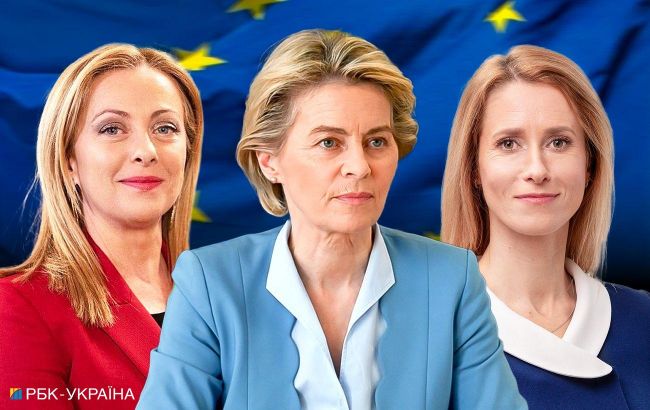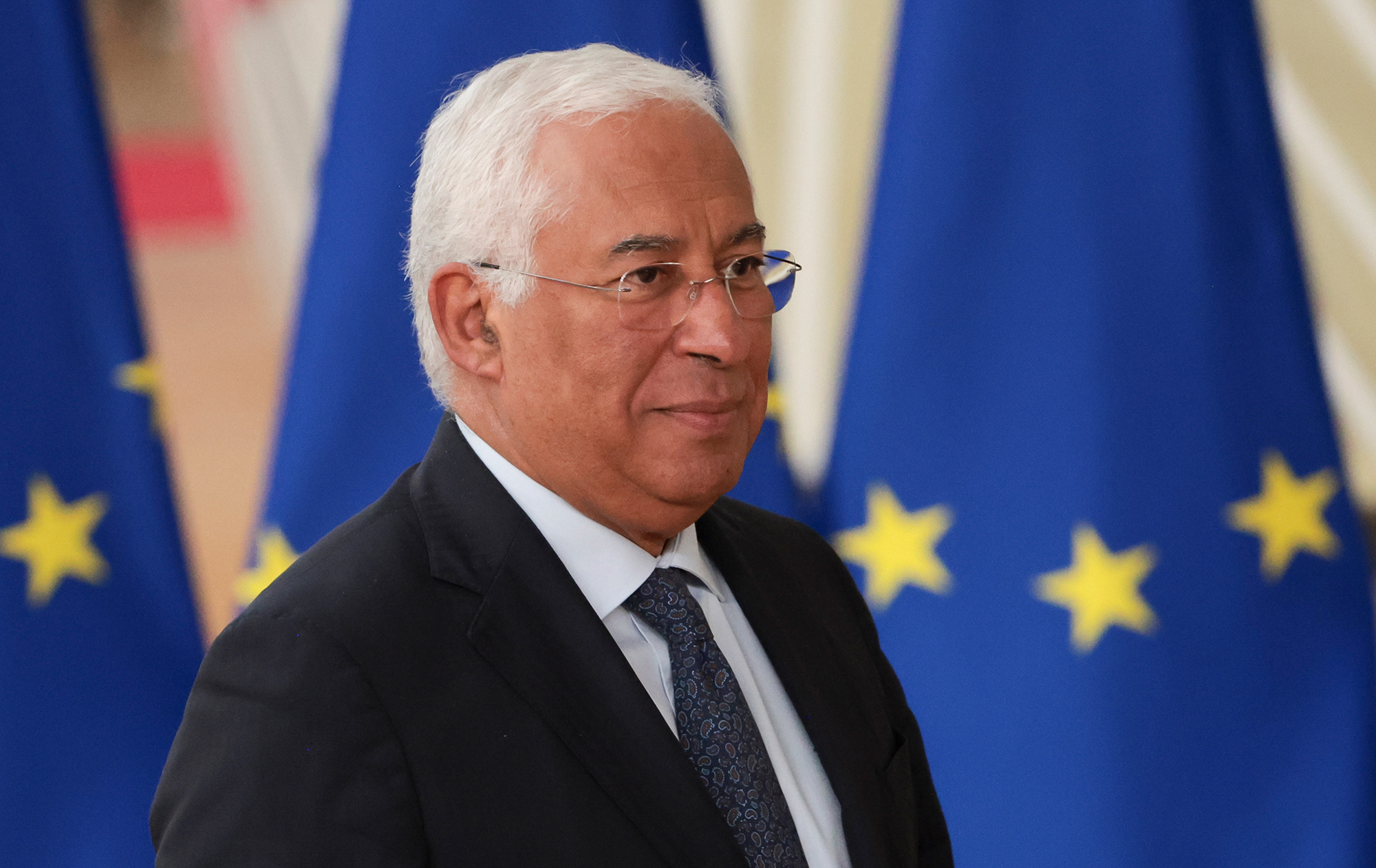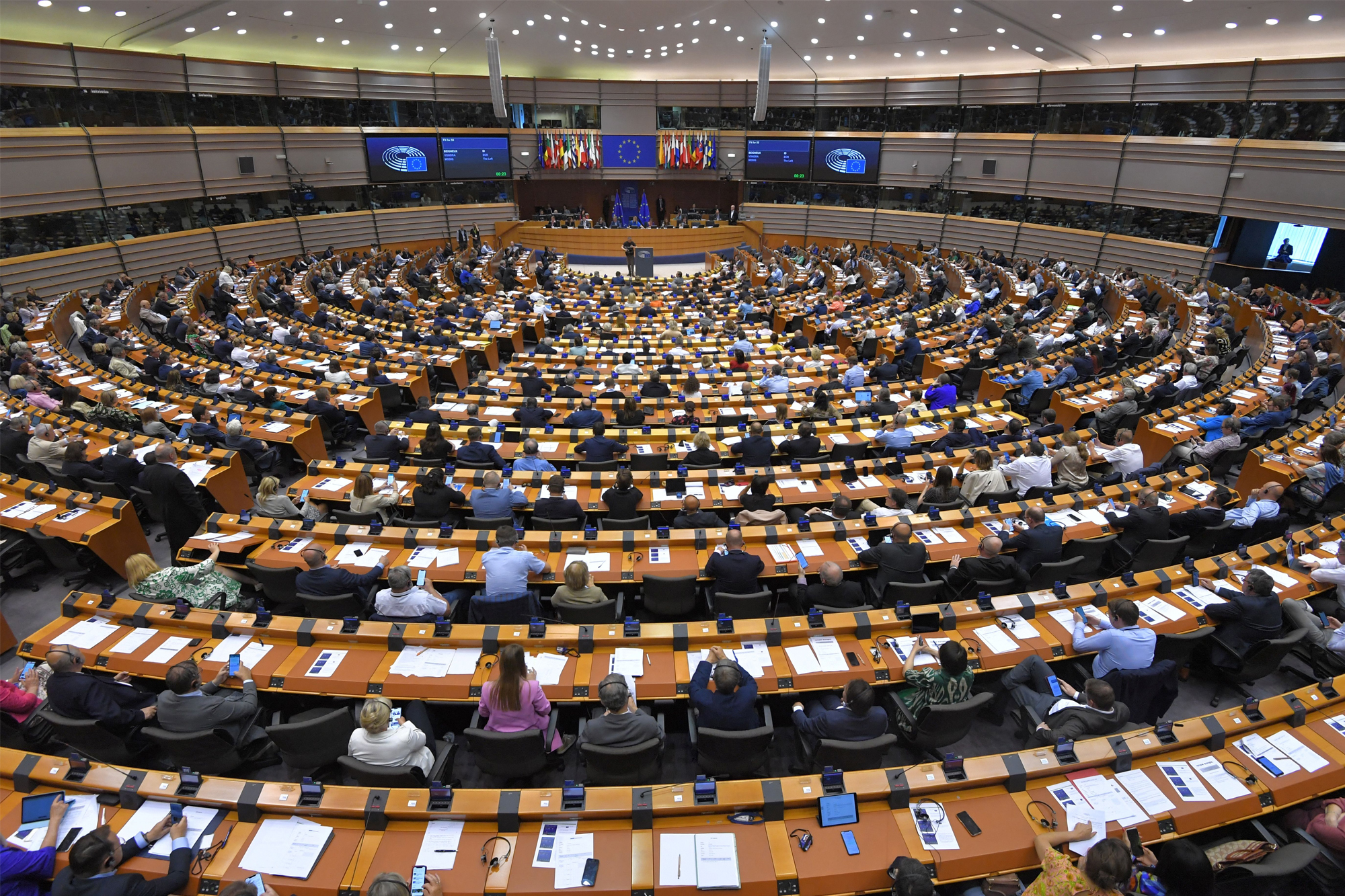New and old faces: Who will lead European Union next and what to expect
 Giorgia Meloni, Ursula von der Leyen and Kaja Kallas (RBC-Ukraine collage)
Giorgia Meloni, Ursula von der Leyen and Kaja Kallas (RBC-Ukraine collage)
The European Union is about to change the heads of its key institutions, though not all of them. Leaders of the EU member states have agreed on preliminary candidates, but the European Parliament still needs to approve them. Who will secure the highest positions in the European Union, what will change with their coming, and what consequences Ukraine may face - read below.
Сontents
- Who appoints top EU officials and how
- Why Ursula von der Leyen stays in office
- António Costa - mediator between EU member states
- Kaja Kallas - EU's chief diplomat?
- Italy's special position and why it is important
- What Central and Eastern Europe is counting on
On June 27-28, leaders of EU member states will approve a new leadership of European institutions in Brussels: the President of the European Commission, the President of the European Council, and the High Representative of the European Union for Foreign Affairs and Security Policy. The names of the candidates were approved the day before.
According to dpa, the current President of the European Commission, Ursula von der Leyen, will keep her post. However, Charles Michel and Josep Borrell will be replaced by former Portuguese Prime Minister António Costa and Estonian Prime Minister Kaja Kallas.
An arrangement was not reached instantly. It took several rounds of consultations. And it's not over yet. After the official approval at the summit, European Parliament permission will be required. This dual appointment procedure caused some difficulties in agreeing on the candidates. And some intrigue remains to this day.
Who appoints top EU officials and how
The procedure for appointing key positions in the EU is quite complicated. Approval is required from both the European Parliament and the leaders of EU member states. But in the latter, it is possible to go without consensus. A qualified majority is required, meaning the support of 15 out of 27 EU leaders from countries representing 65% of the EU population.
The following fact eloquently illustrates the intertwining of these two procedures. The main negotiators on behalf of the coalition were the leaders of the leading states:
The EPP was represented by Polish Prime Minister Donald Tusk and Greek Prime Minister Kyriakos Mitsotakis. The Social Democrats were represented by German Chancellor Olaf Scholz and Spanish Prime Minister Pedro Sánchez. The Liberals sent French President Emmanuel Macron and Dutch Prime Minister Mark Rutte.
As for the European Parliament, everything is relatively simple. A broad coalition is emerging there. The same as in the previous term. This is the center-right European People's Party (EPP), the center-left Socialists and Democrats (S&D), and the centrist Renew faction. They received a total of 408 seats in the European Parliament. As 361 votes are needed for a majority, the margin is not that large. Some MEPs constantly miss meetings. Some do not take Ursula von der Leyen personally.
There were also some difficulties at the level of state leaders. At least two of the three candidates have both supporters and opponents.
Why Ursula von der Leyen stays in office
The current head of the European Commission should be re-elected, as she largely ensured her party's good result in the European Parliament elections and generally knows how to find common ground with the leaders of key EU states - Emmanuel Macron, Olaf Scholz, Giorgia Meloni, and even Viktor Orbán.
"Ursula von der Leyen has shown that she is still a crisis manager who is capable of managing such a complex mechanism as the European Commission. She is still able to push certain political positions at the level of the entire European Union, which is quite important. So no one has any doubt that she should stay," Viktor Savinok, a political scientist and analyst at the Western Institute in Poznań, told RBC-Ukraine.
However, not all coalition members in the European Parliament support Ursula von der Leyen. Critics complain that during Ursula von der Leyen's tenure, the level of bureaucracy in the EU has increased enormously, harming the economy.
Besides, about 10% of MEPs are absent at meetings for various reasons. Therefore, additional votes will not hurt.
António Costa - mediator between EU member states
Former Portuguese Prime Minister António Costa is to become the new President of the European Council. This position is allocated according to an informal quota to the second largest faction of the European Parliament, i.e. S&D.
It took some time to reach an agreement on Costa. His competitive advantages include his negotiating skills and vast political experience. The disadvantages include a criminal case of corruption in his home country and ambiguous management decisions. On the one hand, Costa's government in Portugal has ensured stable economic growth and successful coronavirus vaccination. On the other hand, the Portuguese press has been full of accusations of irresponsible policies regarding nepotism, public administration, and opening the borders to uncontrolled mass immigration.

António Costa (photo: Getty Images)
The President of the European Council does not have the authority to make decisions on behalf of the European Union, but is supposed to mediate between the leaders of EU member states at numerous summits.
The ambiguous facts from Costa's past did not sit well with the EPP representatives.
The S&D does not have many other people at the level of president or prime minister in its ranks. So they had to make some concessions. Costa acknowledged that the European Council's agenda would properly take into account the EPP's political priorities, the German media Frankfurter Allgemeine Zeitung said, citing participants in the talks.
The coalition agreed to maintain the current practice of 2.5 years for Costa's term in office. An extension for the same period may require further agreement.
Kaja Kallas - EU's chief diplomat?
The position of the EU's chief diplomat will go to the third faction in the coalition, Renew. This area will be covered by Estonian Prime Minister Kaja Kallas. According to Politico.eu, her candidacy is being lobbied mainly by French President Emmanuel Macron.
Kaja Kallas is seen as a strong personality who can restore the political position of liberals at the European level. At the same time, other EU member states are concerned about her excessive focus on deterring Russia. For small Estonia that shares a border with Russia, it is not surprising. But EU diplomacy is not limited to countering Russia. Relations with the United States, China, Asia and the Middle East, North Africa to curb migration are important as well. Thus, Kai Kallas will need to master new directions quickly.
At the same time, Kaja Kallas will have less room for maneuver than in her current position. Key decisions on the common foreign and security policy in the EU are made by consensus. Therefore, Hungary, for instance, can block a lot of things.
"Kallas will have very little room for maneuver. So, despite her rhetoric, it may be some rather eloquent gestures, visits to some places, appearing at some crisis points, and so on. To show her presence, but it is unlikely that these will be hawkish gestures, as the position of the Estonian Prime Minister allowed her to do," notes Viktor Savinok.
Italy's special position and why it is important
According to Euraktiv, Italian Prime Minister Giorgia Meloni is particularly critical of Kaja Kallas. Some of the arguments against her have been described above. But there are also purely political motives.
Unlike Olaf Scholz or Emmanuel Macron, Italian Prime Minister Georgia Meloni has a separate faction in the European Parliament, the Conservatives (ECR). This is a political force that is not part of the coalition.
Meloni also leads the country with the third-largest economy in the European Union. She is one of the few incumbent leaders who managed to strengthen her position in the European Parliament. The Italian Prime Minister also influences the position of Hungary, which will hold the EU presidency for six months from July 1.
So it's hard not to take Meloni's position into account. Her team openly states that they would like to get the position of Vice President of the European Commission, who would oversee the EU's economy, industry, and finance. They already have a candidate, the current Minister for European Affairs Raffaele Fitto.

Meeting room of the European Parliament (photo: Getty Images)
Meloni did not participate in the negotiations that approved the new top EU officials. This was a condition of the liberal Renew and the center-left S&D, who promised not to support von der Leyen if she made a deal with the Italian leader.
Nevertheless, Italy is likely to get a very high post in the next European Commission, according to Politico.
What Central and Eastern Europe is counting on
Kaja Kallas is the only representative of Central and Eastern Europe in the EU's top leadership. Still, the weight of countries such as Poland and Romania has increased greatly since February 24, 2022, after Russia launched a full-scale invasion of Ukraine. There are not enough top positions for everyone, so, like Italy, Central and Eastern European states will ask for influential floating positions as European Commissioners.
For a long time, there have been rumors in diplomatic circles that Poland would like to have its own European Commissioner for Defense. Ursula von der Leyen proposed to create such a position earlier this year. However, on June 17, Polish Foreign Minister Radosław Sikorski publicly denied this desire. One reason of the reasons is that the defense sector remains a priority for each country alone.
Instead, Warsaw would like to have its own person in charge of EU enlargement and neighborhood policy. For a long time, this position made no sense, because five years ago no one expected enlargement to be on the agenda again. But after accession talks with Ukraine and Moldova started, enlargement became relevant.
Other Central and Eastern European countries hope to secure a European Commissioner for Transport post. This area is key for them to increase trade with the rest of the EU.
Among the new EU leaders, there are no openly anti-Ukrainian ones. Kaja Kallas and Ursula von der Leyen can even be called, to a certain extent, advocates of Ukraine in the EU. But the question is what they can do in their positions, given the inertia of the European bureaucracy and the constant need to seek compromises.
Sources: Politico Europe, the Portuguese Observador, the German Frankfurter Allgemeine Zeitung, and comments by Viktor Savinok, an analyst at the Western Institute in Poznań.

